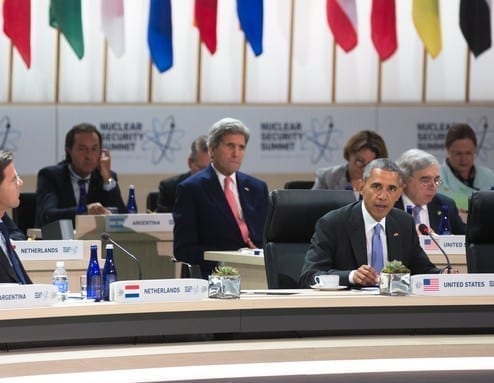On june 19th, 1953 Julius and Ethel Rosenberg- both American citizens, were executed for espionage against the U.S. passing atomic information to the Soviet Union. Subsequently, evidence has shown that indeed Julius was a spy but it was never clear that his wife Ethel was a spy.
Seton Hall Law Professor and Director of the Center for Policy & Research Mark Denbeaux told FoxNews.com. “The point was to do what law students should learn to do: go back to the evidence and find out what is there –then work our way back and see how it evolved.”
Debeneaux gave his law students a research project training them for a future in law through proper research. Students originally assumed Ethel wouldn’t have been executed without sufficient evidence. By the time the finished their research they realized Ethel was a pawn to threaten Julius and extract information from him.
“My father always assumed the Rosenbergs wouldn’t have been executed if they weren’t Jewish,” Denbeaux told FoxNews.com. “If they were waspy Protestants, this wouldn’t have happened.” Denbeaux’s father was General Patton’s chaplain who helped liberate two concentration camps. He always believed that Ethel Rosenberg’s execution was tied to her religious beliefs.
At a secret meeting on February 8, 1950, twenty senior government officials met to discuss the Rosenberg case. Gordon Dean, the chairman of the Atomic Energy Commission, stated: “It looks as though Rosenberg is the king pin of a very large ring, and if there is any way of breaking him by having the shadow of a death penalty over him, we want to do it.” Myles Lane, a member of the prosecution team, said that the case against Ethel Rosenberg was “not too strong”, but that it was “very important that she be convicted too, and given a stiff sentence.”
The weak case against Ethel Rosenberg was “resolved” just 10 days before the start of the trial when Ethel’s brother David and his wife Ruth Greenglass were re-interviewed. They were persuaded to change their original stories. David originally said that he'd passed the atomic data he'd collected to Julius on a New York street corner. Now he stated that he'd given this information to Julius in the living room of the Rosenberg's New York apartment and that Ethel, at Julius's request, had taken his notes and “typed them up”. This “new” testimony made Ethel into an accomplice.
The report uncovered an internal FBI memo dating July 17, 1950 showing there was “insufficient evidence” to arrest Ethel Rosenberg, but that she could be used as “a lever against her husband” to pressure him into confessing. This and additional documents from the FBI and Department of Justice repeatedly note the absence of evidence implicating Ethel in the conspiracy.
Research fellow and report co-author Elizabeth Manusco said: “The government’s manipulation of familial relationships to secure a conviction is just as disturbing today as it should have been 60 years ago.”
The Rosenbergs were convicted on March 29, 1951, and on April 5 were sentenced to death by Judge Kaufman. Prosecutor Roy Cohn, who later assisted Joseph McCarthy as his chief counsel, claimed that due to his influence Kaufman imposed the death penalty based on Cohn's personal recommendation. This may explain the witch hunt mentality which brought about the execution. Kaufman felt that the Rosenbergs were responsible not only for espionage but also for the deaths of the Korean War:
“I consider your crime worse than murder… I believe your conduct in putting into the hands of the Russians the A-Bomb years before our best scientists predicted Russia would perfect the bomb has already caused, in my opinion, the Communist aggression in Korea, with the resultant casualties exceeding 50,000 and who knows but that millions more of innocent people may pay the price of your treason. Indeed, by your betrayal you undoubtedly have altered the course of history to the disadvantage of our country. No one can say that we do not live in a constant state of tension. We have evidence of your treachery all around us every day for the civilian defense activities throughout the nation are aimed at preparing us for an atom bomb attack.”
The Rosenbergs' two sons, Michael Meeropol and Robert Meeropol, spent years trying to prove the innocence of their parents. Orphaned by the executions with no relatives adopting them, high school teacher, poet, songwriter and social activist Abel Meeropol and his wife Anne, adopted them, and they assumed the Meeropol surname.
In 2008 the sons acknowledged their father was involved in espionage, but said that “whatever atomic bomb information their father passed to the Russians was, at best, superfluous; the case was riddled with prosecutorial and judicial misconduct; their mother was convicted on flimsy evidence to place leverage on her husband; and neither deserved the death penalty.”
In reality there was little evidence for Julius and none but fabricated evidence for Ethel that would warrant the death penalty for either. “The report is supportive of the argument we’ve been making for over 40 years and I’m impressed with the work the law students have done. The government took her as a hostage, and they did what terrorists do all the time –they kill the hostage,” son Michael Meeropol told FoxNews.com.
In 2015 the sons asked President Obama to exonerate their mother from wrongdoing. The statement hoped for is still pending. However in honor of her 100th birthday on September 28, 2015, 11 members of the New York City Council issued a proclamation stating that “the government wrongfully executed Ethel Rosenberg”, and Manhattan Borough President Gale Brewer officially recognized, “the injustice suffered by Ethel Rosenberg and her family”, and declared it, “Ethel Rosenberg Day of Justice in the Borough of Manhattan”.
When asked about Obama’s proclamation White House Spokesman Josh Earnest said: I’m sure we’ll take a look,” and that he was “not aware of any work that has been done thus far.”





